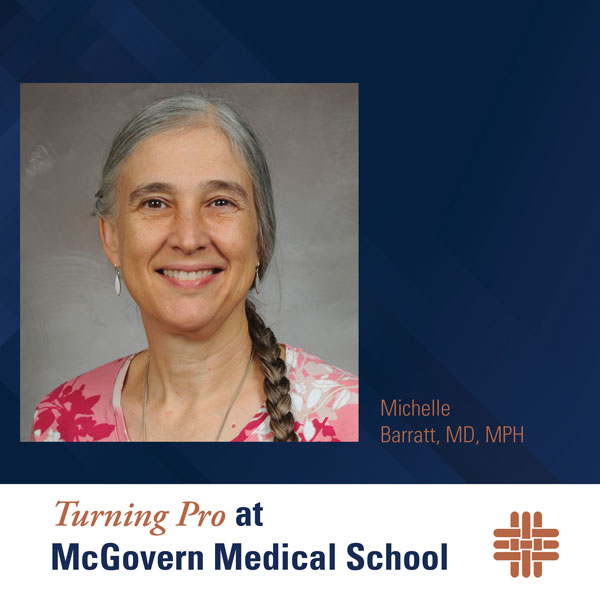Turning Pro at McGovern Medical School: Michelle Barratt, MD, MPH

“Education toward professionalism is more than being skilled and knowledgeable. It requires a lifelong transformational change in how we think, act, and feel as doctors. Our professional formation (Turning Pro) is shaped by the community in which we are surrounded.” – John Riggs, MD, assistant dean for professionalism and The Patricia and Ian Butler Endowed Professor in Medical Profession.
The Turning Pro series explores the myriad of ways McGovern Medical School is educating for lifelong transformation change, so we are individually and collectively highly competent, adaptable, committed to values, and guided to have meaningful lives.
This month’s feature of Turning Pro at McGovern Medical School features Michelle Barratt, MD, MPH, professor in the Department of Pediatrics.
On being honored with the John P. and Kathrine G. McGovern Distinguished Faculty Award in Professionalism Education and why educating for professionalism at McGovern is important
I am honored to be recognized for this award. I am passionate to help medical students, residents, and faculty be the best they can be in all that goes into being a physician. Having been at McGovern Medial School/UTHealth Houston for over 32 years, I am humbled at the number of learners who view me as a mentor and/or role model since I am acutely aware of my own imperfections.
It is imperative that all levels of learners hear not only the good that we accomplish with patients and their families but also the continual learning to become better than we are at any given point in time. Holding onto the reason you entered your career as a physician is also empowering when the realities of busy days and needy patients might otherwise feel overwhelming.
On an example of fostering professional identity in medical students
My absolute favorite is co-directing the first-year medical student elective, The Healer’s Art. This 5-evening course is held each year in January and February. The course provides a safe space and fosters generous listening as discussions occur within small groups of students with their faculty preceptor following a large group session.
The course focuses on maintaining your whole self within the role of physician. Students are encouraged to hold onto things about themselves they may have thought they had to give up, ranging from art to music to sports to emotional sensitivity. Lived experiences of loss and grief, as well as awe and mystery, are discussed with the final session on Care of the Soul: Service as a Way of Life. Following my seed talk for this final session, the course allows time and space for each student to create their own vision of their career as a physician.
On training for residents and how they have responded to professionalism education efforts
Another area of importance to me is our reaction as physicians to encounter errors. Errors are inevitable as humans yet somehow the hidden curriculum in medicine sets us up to think no other physician but us has ever failed. Brene Brown teaches about shame as contrasted to guilt. I specifically share about my errors, especially one that allowed a child to be further injured by an abusive parent. By not allowing shame to keep me hiding my error, I can acknowledge aloud how I live with the guilt and pay forward the learning in hopes that others will not fall into the same error with a different child. Ask me for the story when we work together and download the Child Protector app to your phone if you ever care for children. By modeling transparency of my errors, the residents are open to sharing their own experiences with error.
Additional thoughts on professionalism at McGovern Medical School
I am so glad I get to speak on day one for the McGovern Medical School class, including an acknowledgement of imposter syndrome. I received this note from a student who rotated through our busy Pediatric clinic:
“One of my greatest fears entering medical school was ‘feeling’ like a medical student. At no point in foundations did I feel fit, ready, or deserving of a position in class, and that reflected on my grades. Thanks in part to you, I may not have the knowledge of clinical medicine, but I am at least able to communicate and feel more intertwined in the patient’s care and definitely feel like a med student now.”
My desire for every student, and ever resident, and every faculty member is to know their worth and no matter the inevitable errors that occur to rise above to strive for excellence in all they do. My personal educational philosophy: Nurture learners to excellence in pediatric care through role modeling and relationships.